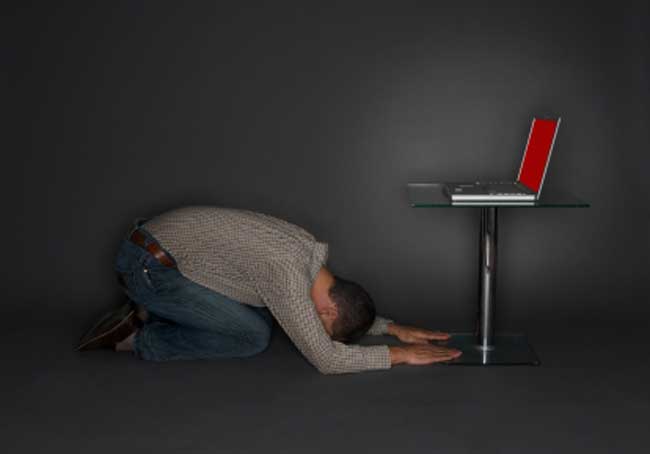Internet Addicts Get First U.S. Treatment Clinic

Hardcore Internet junkies now have their very own version of the Betty Ford clinic.
The Heavensfield Retreat Center, located in Fall City, Wash., claims to be the first U.S in-patient center to treat Internet, video game and texting addictions. Enrollment in the clinic’s 45-day Internet addiction recovery program, called reStart, costs roughly $14,500.
The program is designed to wean patients off the Internet by combining traditional talk therapy with social skills training, such as lessons in conversation techniques and dating. Patients also feed goats, raise chickens and do home-maintenance work as a way of getting reoriented with the offline world.
The clinic's staff has already enrolled thier first patient: a 19-year-old boy from Iowa who admitted to being hooked on the online game World of Warcraft.
While it may seem like an extreme (not to mention pricey) way to get unplugged, Stuart Fischoff, a psychologist and Senior Editor at the Journal of Media Psychology, believes the rehab approach can be helpful.
"For patients in clinical settings, exposing them to friendly animals has had very positive effects," said Fischoff, who is not affiliated with the new clinic. "The purpose here is to get the patient to experience gratification from something that doesn’t require an Internet connection. So giving the patient someone who needs them, appreciates them and doesn’t judge them allows them to reach out to the flesh-and-blood world."
Is Web addiction real?
Sign up for the Live Science daily newsletter now
Get the world’s most fascinating discoveries delivered straight to your inbox.
The program’s Web site cites research that suggests “anywhere from 6 and 10 percent of the online population is dependent on one or more aspects of cyber technology and the Internet.”
However, the emerging notion of “Internet addiction” remains controversial. The term has yet to be recognized by the American Psychiatric Association as a disorder and is not listed in the APA's Diagnostic and Statistical Manual of Mental Disorders (DSM). But some experts have lobbied for its inclusion in the manual’s upcoming revision, due out in 2012.
Ronald W. Pies, a professor of clinical psychiatry at Tufts University, said much of the debate hinges on whether Internet abuse is a distinct disorder or merely a symptom of deeper psychological problems.
"There are often underlying or co-occurring psychiatric disorders, such as anxiety, depression or a disturbance in interpersonal relationships, all of which may explain the person's internet problems,” Pies told LiveScience. "The question is, do we need another 'disorder' in our DSM, if the manifestations of Internet addiction can already be accounted for by well-described and better-validated conditions?"
Though very little research on Internet addiction exists, one notable study conducted by Stanford University researchers found that more than one out of eight Americans displayed signs of "problematic Internet use," such as having difficulty staying away from the Internet for several days at a time. But the study’s authors admitted that the results were "too premature" to warrant a medical diagnosis. The conclusions were based on a telephone survey of 2,513 adults in 2006.
"We may eventually come around to the view that Internet addiction is a discrete mental disorder, but that will require carefully-designed research aimed at linking Internet addiction with family and genetic factors, biological concomitants and responses to specific treatments," Pies explained.
As of now, "there has not yet been sufficient investigation of the question using well-defined criteria for Internet addiction," he added.
Fischoff doesn’t view the Internet itself to be “addictive,” but rather “it’s the various things people can do online such as gambling, porn or gaming, that are addictive.”
"The Web is simply a very good delivery system for activities that are potentially addictive," Fischoff said in a telephone interview.
Will it work?
Meanwhile, Internet addiction treatment is not a new concept.
In China, there are roughly 400 Internet addiction clinics, where some patients have been reportedly subjected to shock therapy. On Aug. 2, a 15-year-old Chinese boy was beaten to death less than a day after his parents checked him into one of the Internet addiction boot camps, according to news reports.
Although he finds the treatment methods outlined on reStart's web site to be based on sound psychotherapeutic principles, Fischoff doesn't expect rehab alone to have a long-lasting effect.
"I don't think rehab will be a cure-all for anybody, whether it's a drug addiction, gambling or the Internet,” he said. "You can modify people's behavior in a particular environment, but if they have not developed the proper social skills, they'll retreat back into their old ways once they get back out into the real world.”
"The hope here is that what is introduced to the patient would at least get them on the path toward expanding other parts of their life," Fischoff added.
- Video - Addiction: It's in Your Genes
- Bad Habits: Why We can't Stop?
- 10 Bad Things That Are Good For You









